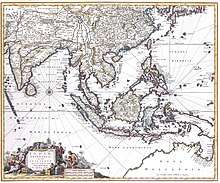
Back سياسة أخلاقية هولندية Arabic Politique éthique des Pays-Bas en Indonésie French Politik Etis ID Pulitik étis JV Nīderlandes ētikas politika Latvian/Lettish Politik balas budi Malay Ethische politiek Dutch Politicile etice neerlandeze Romanian Этическая политика Нидерландов Russian Hollanda Etik Politikası Turkish
| History of Indonesia |
|---|
 |
| Timeline |
|
|
The Dutch Ethical Policy (Dutch: ethische politiek) was the official policy of the colonial government of the Dutch East Indies (present-day Indonesia) during the four decades from 1901 (under the Kuyper cabinet) until the Japanese occupation of 1942. In 1901, Dutch Queen Wilhelmina announced that the Netherlands accepted an ethical responsibility for the welfare of their colonial subjects. The announcement was a sharp contrast with the former official doctrine that Indonesia was a win-gewest (region for making a profit) and also marked the start of modern development policy. Other colonial powers talked of a civilising mission, which mainly involved spreading their culture to the colonised peoples.
The policy emphasised improvement in material living conditions. It suffered, however, from severe underfunding, inflated expectations, and the lack of acceptance in the Dutch colonial establishment. The policy had mostly ceased to exist by 1930, during the Great Depression.[1][2]
- ^ Cribb, Robert (1993). "Development Policy in the Early 20th Century", in Jan-Paul Dirkse, Frans Hüsken and Mario Rutten, eds, Development and Social Welfare: Indonesia’s Experiences under the New Order (Leiden: Koninklijk Instituut voor Taal-, Land- en Volkenkunde), pp. 225-245.
- ^ Ricklefs, M.C. (1991). A History of Modern Indonesia Since c.1300. London: Macmillan. p. 151. ISBN 0-333-57690-X.
© MMXXIII Rich X Search. We shall prevail. All rights reserved. Rich X Search